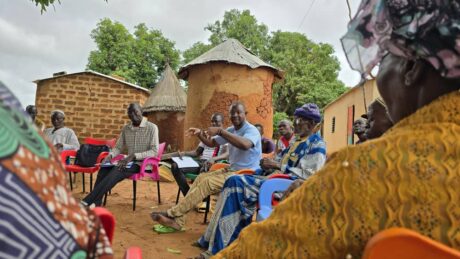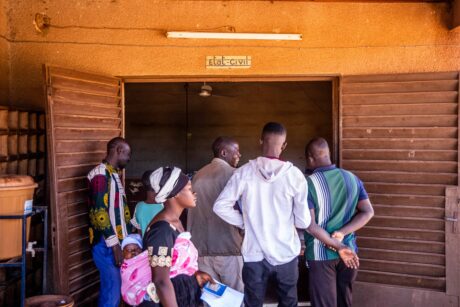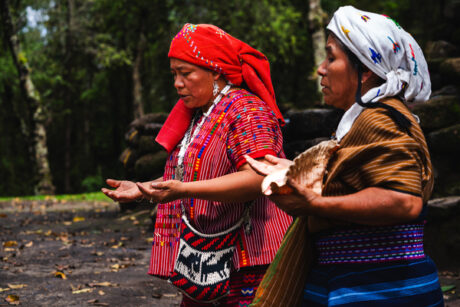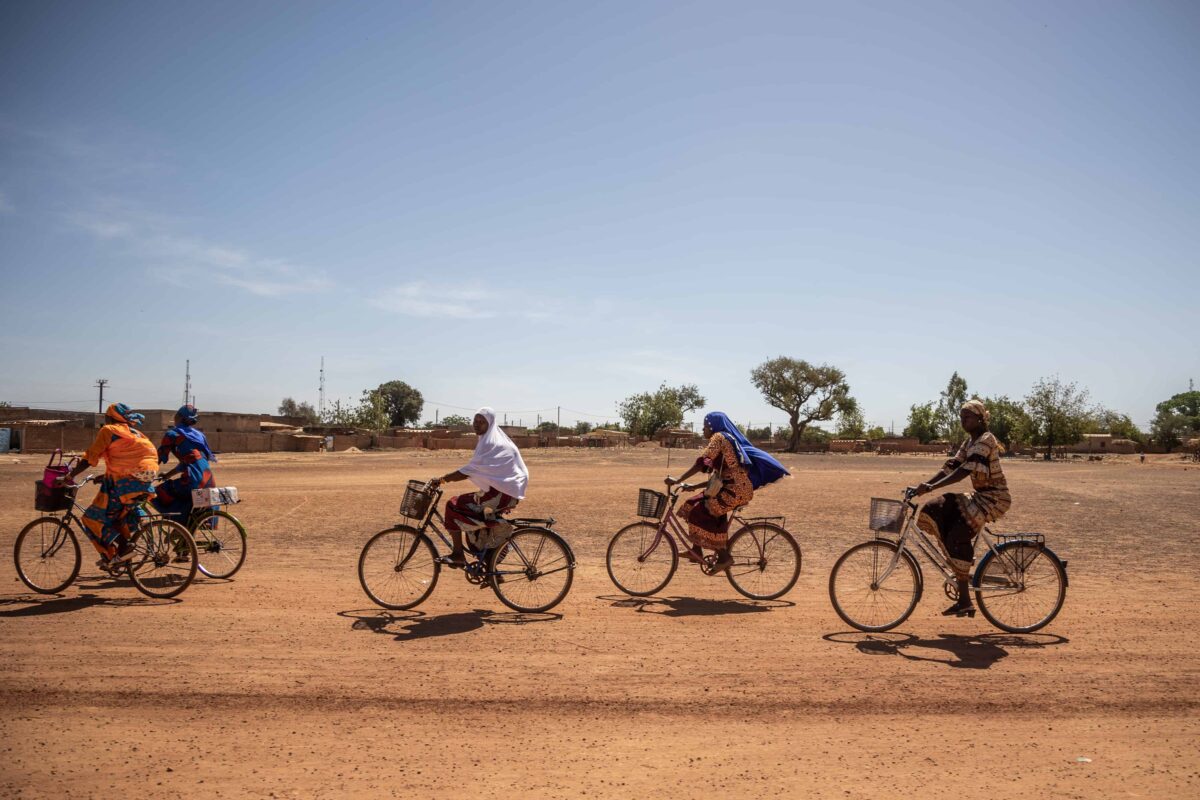Imagine esperar na fila de um prédio do governo, horas de onde você mora. Agora, imagine esperar nesta fila com um bebê recém-nascido em casa.
Você está esperando para pegar a certidão de nascimento do seu bebê, que não lhe foi disponibilizado no hospital quando o seu bebé nasceu. Quando você finalmente chega na frente da fila, você é informado de que a certidão de nascimento ainda não está pronta. Disseram-lhe para voltar amanhã.
Você explica que mora longe, que você tem que trabalhar, que você não pode volte amanhã. Pode até ser perigoso para você viajar, à medida que grupos extremistas violentos continuam a ganhar território e a lançar ataques violentos contra civis como você. O funcionário do governo encolhe os ombros e diz que não há nada que possa fazer.
Quais são as consequências desta lacuna na governação local?
Quando os novos pais dão as boas-vindas a um filho, a última coisa em que pensam é lidar com atrasos burocráticos e burocracia, muito menos os perigos das viagens. Mas esta foi a realidade para muitos novos pais e famílias no Burkina Faso.
Sem certidão de nascimento, ou qualquer outra forma de identificação, as famílias no Burkina Faso não podem candidatar-se a serviços ou benefícios governamentais para os seus filhos. Isto significa que os atrasos burocráticos não são apenas inconvenientes – são prejudiciais.
What can community members do to address this challenge?
USAID’s Burkina Faso Inclusive Governance for Resilience Project (RIG) supported citizens and civil society workers to collaborate with local government officials on Roadmaps to Resilience, commune-wide planning documents with guidelines and actionable steps towards resolving their communities’ challenges.
They developed Roadmaps to Resilience through a co-creation process with diverse community actors, laying the groundwork for inclusive strategic planning and fostering partnerships with different actors in the local governance system to address community priorities. During workshops to draft Roadmaps to Resilience, participants in communes like Péni, Ouahigouya e outros em todo o país identificaram atrasos burocráticos relacionados com a recepção de bilhetes de identidade nacionais e certidões de nascimento como uma questão fundamental na sua comuna ou município.
Por que cartões de identificação?
Como certidões de nascimento, os bilhetes de identidade nacionais são recursos essenciais para as pessoas no Burkina Faso se candidatarem a serviços governamentais, benefícios e empregos. Para o fim dois milhões de cidadãos burquinenses deslocados internamente, ou deslocados internos, que fugiram das suas cidades natais para escapar ao extremismo violento, o problema é agravado. Os deslocados internos são muitas vezes forçados a abandonar as suas casas a qualquer momento, e muitos não conseguem levar consigo os seus bilhetes de identidade nacionais ou outros documentos oficiais.
Sem esses documentos, eles não podem ter acesso à assistência alimentar ou outro apoio crítico nas comunidades anfitriãs. ID cards are also essential documents for elections and political processes, allowing citizens to participate in the democratic process. This is critical, as Burkina Faso’s transitional government has pledged to hold elections at the end of the country’s transition period.
What else do Roadmaps to Resilience address?
Roadmaps to Resilience highlight challenges and provide solutions around issues of access to government documents, as well as the representation of women and minorities in government decision-making, communication gaps between government and citizens, and other areas of local governance that, when resolved, will strengthen democratic processes at the local level and ultimately improve social cohesion and community resilience against violent extremism.
O Projeto de Governança Inclusiva para a Resiliência também está trabalhando para fortalecer as capacidades das prefeituras e delegações especiais — órgãos do governo local compostos por representantes oficiais e da sociedade civil — no planejamento estratégico participativo., desenvolver mecanismos de feedback e reclamação, transparência, prestação de serviço, e orçamento sensível ao género. Por aqui, os governos locais têm a formação e a capacidade necessárias para implementar os seus Roteiros comunitários para a Resiliência de uma forma que seja sustentável e responsiva.
Governo local, a sociedade civil e outros parceiros comunitários compreendem que alcançar os objetivos estabelecidos nos Roteiros para a Resiliência levará tempo e que, em última análise, é sua responsabilidade implementá-los.
Mas o Projecto de Governação Inclusiva para a Resiliência pode ajudar.
Para fornecer suporte imediato, o Projeto de Governança Inclusiva para Resiliência trabalhou com governos locais para emitir mais de 57,000 Bilhetes de identidade para cidadãos burquinenses, muitos dos quais são deslocados internos. O Projeto Governação Inclusiva para a Resiliência concedeu uma subvenção à Direção-Geral da Modernização do Estado Civil (DGMEC) apoiar o seu trabalho contínuo de digitalização de registos civis nas comunas de todo o país para equipar as comunas para fornecer estes serviços administrativos críticos de forma eficiente. A subvenção do Projeto de Governança Inclusiva para Resiliência permitiu que o projeto comprasse scanners, computadores e discos rígidos externos e deu formação aos funcionários da Direção Geral de Modernização do Estado Civil sobre a utilização dos equipamentos. A equipe irá então treinar funcionários do governo da comuna.
DGMEC aims to digitize all commune-level records by March 2025 so that citizens — including new babies — can access ID cards and birth certificates without delay. Other communes, including Ouahigouya, are launching efforts to establish civil registry centers in rural areas so that new parents can access birth certificates closer to their homes and will no longer need to travel long distances.
In addition to ID cards, civil society members identified the need to create spaces for women, youth and people with disabilities to speak with their local government representatives and ensure their voices are heard.
The Inclusive Governance for Resilience Project supported civil society organizations to set up coalitions to train these populations in advocacy techniques and civic engagement. Hoje, os membros destas coligações em comunas como Yako reúnem-se trimestralmente com as autoridades locais para discutirem os seus pontos de vista sobre assuntos importantes. problemas. As coalizões ainda são novas, mas os membros estão confiantes de que terão um forte impacto nas políticas comunitárias e na tomada de decisões.
Roteiros para a Resiliência como modelos para comunidades fortes e governação local responsiva
Com o apoio do Projeto de Governança Inclusiva para Resiliência, os membros da comunidade em todo o Burkina Faso estabeleceram parcerias eficazes para trabalhar com os funcionários do governo local para resolver os desafios da sua comunidade que são mais importantes para eles. Roteiros para a Resiliência apoiam parcerias produtivas entre governos locais, organizações da sociedade civil e comunidades, incluindo grupos marginalizados, para fortalecer o foco no cidadão, governança local responsiva.
Esses relacionamentos fundamentais, cultivado com o apoio do Projeto de Governança Inclusiva para Resiliência, ajudar a promover a resiliência da comunidade a choques políticos e sociais, reforçar as bases para uma sociedade democrática no Burkina Faso durante este período crítico de transição política.
A contribuição adicional para este blog veio de Ali Dabre em Ouagadougou, Burkina Faso.
Pam Rosen é Program Associate da área de prática de Governança da Creative, apoiando o projeto de Governança Inclusiva para Resiliência de Washington, DC. Ela já trabalhou em projetos de apoio à construção da paz, gestão de conflitos, e mecanismos de alerta precoce/resposta precoce na África Ocidental. Pam received her MA in Conflict Resolution and International Security from the Fletcher School at Tufts University and holds a BA in International Studies and Political Science from Macalester College.



